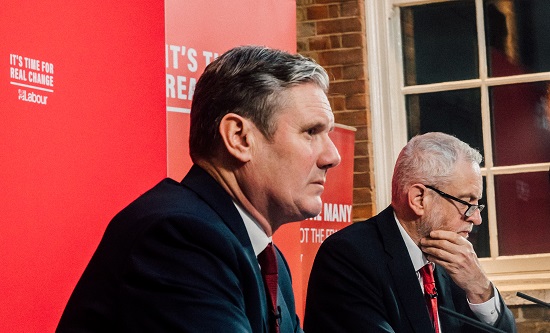Labour leader Sir Keir Starmer has taken a further step in isolating the left within the Labour Party by refusing to re-admit Jeremy Corbyn to the Parliamentary Labour Party (PLP). Corbyn’s suspension from the Labour Party itself ended on 17 November. However, the PLP through the chief whip Nick Brown is demanding that Corbyn ‘unequivocally, unambiguously and without reservation apologise’ for his response to the Equality and Human Rights Commission (EHRC) report. Corbyn in turn is taking the Labour Party to court as he insists that Starmer had agreed to readmit him to the PLP as part of a deal to end his suspension from the party as a whole.
Corbyn’s crime had been his response to the EHRC Report, that the scale of the anti-Semitism problem within the Labour Party had been ‘dramatically overstated for political reasons by our opponents inside and outside the party, as well as by much of the media.’ Re-admission to the Labour Party required him to state: ‘I regret the pain this issue has caused the Jewish community and would wish to do nothing that would exacerbate or prolong it. To be clear, concerns about anti-Semitism are neither “exaggerated” nor “overstated”.’ But his original response had not minimised concerns about anti-Semitism per se, merely its alleged scale within the Labour Party. His concession was therefore an apology for something which he hadn’t said. Not surprisingly, it was immediately rejected by the Zionist wing of the PLP, with the reactionary millionaire MP Margaret Hodge threatening to resign from the Labour Party and describing Corbyn’s readmission as ‘a broken outcome from a broken system.’ Starmer seized on the Zionist reaction to tighten the screws on the left and keep Corbyn out of the PLP.
By taking legal action, Corbyn has deliberately depoliticised his continued exclusion. The last thing he wants to do is to conduct a political struggle which would pose the possibility of a split in the Labour Party. He will look for a compromise that allows him to return to the PLP: thoughts or hopes that he might lead a split are a fantasy.
Labour left: sound and fury signifying nothing
The Labour left will meanwhile keep up its forlorn attempts to transform the Labour Party. While it may trumpet a success in winning five out of nine Constituency Labour Party seats in elections to Labour’s National Executive (NEC) on 14 November, this was a poor return for the effort it had put in to take all nine. As it was, the most first-round votes by a long chalk went to Luke Akehurst (21,355 votes as against 15,688 for Laura Pidcock), a right-wing Zionist who is director of We believe in Israel. Overall, Starmer supporters consolidated the Labour leader’s position by taking eight out of the total of 15 NEC seats that were up for election. Petulant at Corbyn’s continued exclusion from the PLP, 13 left members of the NEC staged a ‘digital’ walkout at its next meeting. Their absence provided the opportunity for the remaining attendees to elect right-wing MP Margaret Beckett as NEC chair, breaking with a tradition that would have seen the pro-left Ian Murray as NEC vice-chair succeed the outgoing chair Andi Fox. Starmer 1, Labour left once again, 0.
Starmer has no need to make concessions to the Labour left: he knows that the last thing it wants is to break from Labour. The NEC walkout was a gesture of weakness, not strength. Starmer is free to position Labour once again as a vociferous defender of British imperialism, defending Israel and British Middle East interests, banging the drum for a more aggressive stance against Russia and China, and supporting the government’s proposed £16.5bn boost of defence expenditure. He has ensured that Labour abstained on government proposals to grant immunity for crimes committed by undercover agents where they have been authorised. Labour’s flirtation with the tepid form of radicalism that Corbyn represented is definitely over: its normal reactionary service is being restored.
Robert Clough




